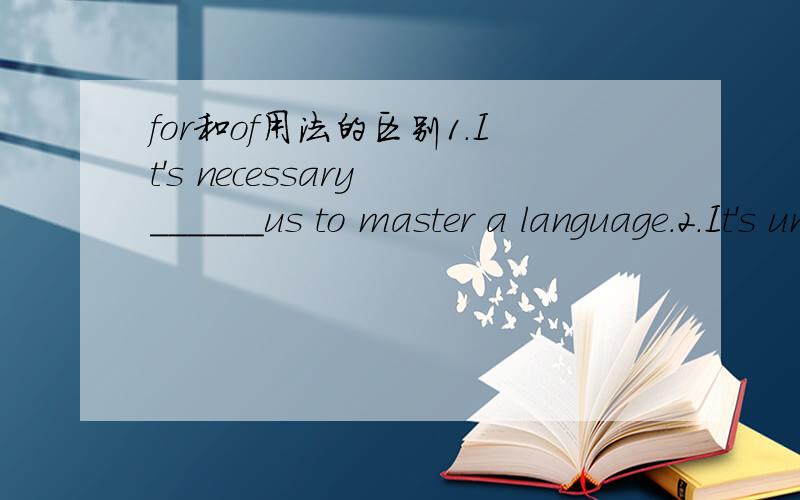for和of用法的区别1.It's necessary ______us to master a language.2.It's unwise ______them to refuse our help.3.It is very important _____us to study some rules.4.It is unpracticable ______us to finish such a difficult taskin such short time.5.It
来源:学生作业帮助网 编辑:作业帮 时间:2024/09/09 18:51:30

for和of用法的区别1.It's necessary ______us to master a language.2.It's unwise ______them to refuse our help.3.It is very important _____us to study some rules.4.It is unpracticable ______us to finish such a difficult taskin such short time.5.It
for和of用法的区别
1.It's necessary ______us to master a language.
2.It's unwise ______them to refuse our help.
3.It is very important _____us to study some rules.
4.It is unpracticable ______us to finish such a difficult task
in such short time.
5.It's wrong _____a person to think only of himself.
哪些用of哪些用for,请说明原因,我老分不清楚.
for和of用法的区别1.It's necessary ______us to master a language.2.It's unwise ______them to refuse our help.3.It is very important _____us to study some rules.4.It is unpracticable ______us to finish such a difficult taskin such short time.5.It
1.It's necessary ___for___us to master a language.
2.It's unwise ___of___them to refuse our help.
3.It is very important ___for__us to study some rules.
4.It is unpracticable ___for___us to finish such a difficult task
in such short time.
5.It's wrong __of / for___a person to think only of himself.(这一句for / of 都可以,看你站在什么立场上,出题人不太严谨)
窍门:
如果被认为是普遍现象,就用for,如:
1.It's necessary ___for___us / people to master a language.
2 It is very important ___for__us / learners to study some rules.
3 .It is unpracticable ___for___us / anyone to finish such a difficult task in two days.
如果被认为是某个人的个别现象,我们就用of,如:
1 It was wrong of me / John / us / the girl to be late again ans again.
2 It is very kind of him to give us so much help.(也就是说,he肯,但别人不一定肯)
1. for (for在此表示“对......来说”)
2. for (理由同上)
3. for (同上)
4. for (同上)
前四个题里都含有一个相同的句型:It's + adj.+ ( for sb. ) + to do sth. “对某人来说做某事是......的。”
5. for
for与of的区别:
介词for可以用来表示“原因...
全部展开
1. for (for在此表示“对......来说”)
2. for (理由同上)
3. for (同上)
4. for (同上)
前四个题里都含有一个相同的句型:It's + adj.+ ( for sb. ) + to do sth. “对某人来说做某事是......的。”
5. for
for与of的区别:
介词for可以用来表示“原因”或“目的”;of则表示所属关系,是“名词所有格”这个语法项目里的一部分,翻译出来是“......的”,但翻译的时候要从of后往of前翻译。例如翻译“Maria是我的朋友之一”: Maria ia a friend of mine.
收起
你确定这里有可以用of的吗? 我觉得都用for比较合适 呵呵